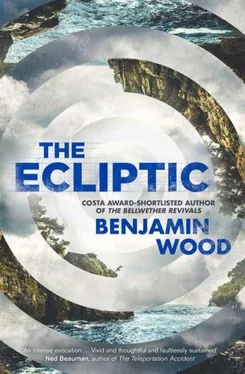Jim put a hand on the small of my back and held it there. ‘I just never imagined you needing that kind of help. You always seemed to pour everything into your work. It was like you had another life up there in that attic — your own little sanctuary.’ His thumb was rubbing now at the cotton of my blouse. It made my pulse accelerate. ‘What’s he like, this shrink of yours, anyway? You trust him?’
I nodded. ‘He’s been good to me.’
‘I suppose all those qualifications have to count for something.’ Jim paused. I could almost feel his roving eyes upon me. ‘You should probably do what he says, then. Don’t take medical advice from me. I never even got my Leaving Certificate.’
‘Me neither,’ I said.
‘See. We’re the same, you and me.’
‘ Jim .’
‘What? What did I say?’ But I was not dissenting from his words, only his fingers: they had loosened the blouse from my skirt and were walking up my bare spine. His eyes were tightened, searching. He turned me slowly, brushed my clavicle with his knuckle.
I had to arch up on my tiptoes just to kiss him. His face was coarse with stubble, but his lips had a pleasing gentleness.
‘There,’ he said. ‘Now we can both stop imagining it.’
For the very first time, we slept in the same bed. Beside the fire on the single mattress. Huddled together like stowaways. His hands seemed to know where to go. They knew me in the way that Wilfred Searle’s had not even tried to. I wanted to be kept inside Jim’s skinny arms forever, wanted to hold my lips against the scuffed skin of his neck and breathe it every morning as I woke up, wanted to feel him lift and hook the trailing hair behind my ear and stroke it, nimbly and repeatedly, just as he would approach the painting of a Judas blossom. But there was no pattern or rhyme to our being together. There were nights when he lay restless and went off to be alone, and nights when he tempted me from sleep with kisses on the cheek and climbed in, undressing me, only to steal away again before the daylight broke.
We lived this way for months, as intermittent partners, lovers, individuals. We were bonded in our isolation and invested in each other’s purpose. Occasionally, we quarrelled. We spent hours — full days sometimes — apart, in protest. And neither one of us could work without listening for the noises of the other, so came to recognise the creaks and thuds and hums of one another’s practice the way that a piano-tuner can discern a slackened string from corridors away. But we shared the few rooms of that tumbledown cottage as happily as any two people could. Our connection felt immutable.
Jim even helped me clear the junk from the back room, and we found a trove of objects that we could sell: Henry’s old fishing gear and tackle, a roll of boat upholstery fabric, a box of earthenware crockery, and five reels of soldering wire. It was agreed that Jim should take them to the weekend market in Balloch. ‘Henry would be telling us to flog the bleedin’ lot if it keeps us fed and watered,’ Jim said. ‘You should hang on to that cloth for painting, though. It’s proper marine canvas.’ He left that Saturday with everything loaded on his body like a pack-mule and came back with a crate of groceries, including flour and cooking chocolate. ‘For the celebration cake,’ he said, pecking my forehead.
I started thinking again about my mural, and tentatively trialled a new white pigment made from thistles Jim discarded; but these experiments came to nothing. Mostly, I worked on sketches of myself: the grimy cottage windows reflected my face strangely, ruffled and distorted it. I found this spectacle curious enough to occupy me. The drawings came out less like studies of myself than Pathé newsreel stills of strangers. And, through all of this, Jim remained committed to his Judas blossom paintings. They grew steadily more arresting. It was difficult to glean the meaning of them when each piece was seen in isolation, but soon the lounge grew cluttered with his boards — each scattering of pink blossoms different from the last, the colours in them shifting, layers deepening — and I could feel the strength of the work as a collection. I was proud to have made a contribution to it, however incidental.
But then, one morning, I got up to find Jim already gone. The coals were pallid in the hearth. A pot of tea was stewing on the kitchen table, still warm. Outside, a gauzy rain was teeming. I lit the fire and made a pan of porridge, knowing he would come home cold and hungry, and sat by the fireplace eating most of it until he returned. When he stepped in through the back door, he was drenched and broody. His basket was very short of pickings. He went straight into the bathroom to towel off, saying nothing. His quietness seemed very determined, so I asked him what was wrong. ‘Just counting all the things I’ve got to do today,’ he said. Then, later, when he went to light the stove under the kettle after lunch, he found the matchbox empty and it left him quietly incensed. For most of the day, I could hear him huffing and sighing from the back room, where I had begun inking some of my sketches (a mere gesture to convince him I was working). Around three, he called me into the lounge. ‘Ellie, get in here.’ His voice grew increasingly desperate. ‘Ellie — I need you!’ I expected to find him mullering another batch of pigment. In fact, he was over by the window with several of his paintings laid across the floor on bedsheets. His easel and his workbenches were pushed against the walls. He was stooping over the paintings with a camera, twisting at the aperture. ‘How the heck do you work the light gauge on this thing?’ he said. ‘I’ve got two rolls of film and I don’t want to waste them.’
‘Where’d you get that from?’ I asked.
He handed me the camera — shoved it at me. ‘It’s the same one I’ve always had. I’m not sure the light is good enough. Might have to wait until the morning.’
I peered through the viewfinder, focused the shot. The gauge was unresponsive. ‘I think it needs a new battery,’ I told him. ‘What’s your film speed?’
‘Don’t know.’
‘You’ve got it on 400.’
‘Sounds about right.’
‘Well, I can try to set the f-stop where I think it should be, but I’m no good without a light meter. I can’t promise it’ll be perfect.’
‘You might as well just do it,’ he said. ‘Set it up however you think’s best. I don’t know where I’d get a battery from round here, and I don’t want to waste time.’
‘What are the photos for, anyway?’ I asked.
‘Portability,’ he said.
In the viewfinder, his paintings were much less vivid. ‘I don’t get it.’
‘You don’t have to. Here — give it back. I can manage the rest.’
I had not even clicked the shutter yet. ‘It’s difficult to get the whole thing in the frame. You’ll need to stand up on a table.’ And then his meaning finally landed. ‘Are you taking these to show someone?’
His cheek stayed pressed to the camera. ‘You’re right — I need to get up much higher.’ He slid one of the workbenches closer to the paintings and leapt onto it, the legs buckling slightly under his weight. ‘Better,’ he said, focusing. ‘A tripod would be nice, but you can’t have it all.’ He clicked, and loaded the next frame, his thumb jabbing hard at the lever.
Jim had deflected so much attention onto my plans and my lack of purpose in the past few months that I had not paused to consider where his own ambitions were steering him. The daily accretion of Judas blossom paintings had been his priority for so long that I assumed he would go on forever. Until I die— they were his words. Until I die. The thought that he might suddenly stop making them had not once entered my mind. ‘What are you planning to do with these, Jim? I don’t see what the rush is.’
Читать дальше












